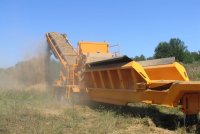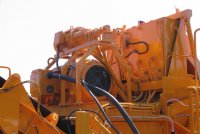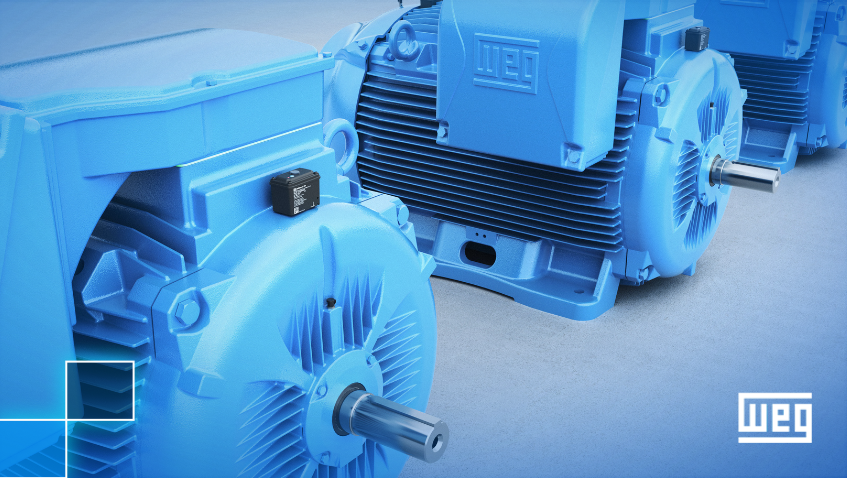As the worldwide economic and subsequent oil crisis began to place a burden on many businesses with heavy-equipment, Bandit began to hear a common cry for help from their customers. Fuel costs were skyrocketing, and many land clearers, wood recyclers, and municipalities found that much of their equipment, — which relied heavily on diesel fuel — was becoming too expensive to generate profit. That’s when Bandit came up with a solution.
The Beast horizontal grinder, manufactured by Bandit Industries and utilized by many of these companies in reducing large diameter materials and other biomass and wood waste, incorporates a cutting action as opposed to the typical a beating action to break down material. Bandit often tells their customers to consider the difference between chopping wood with an axe or a sledgehammer: which is more efficient? Because of the cutting action of the Beast mill, these units are already some of the most fuel-efficient on the market. But even the most fuel-efficient grinder can bear a heavy burden on a company’s financials when oil prices reach upwards of $120/barrel, as they did in 2008.
Although Bandit is confident that their Beast Recycler is the most effective means of breaking down materials into valuable end-products, they are also aware that each application is unique and sometimes, a diesel motor may not be the best solution. So after much research, Bandit decided to introduce an electric motor as an option on Beast Recyclers, powered by WEG. Quite quickly, customers realized the enormous savings in energy costs and maintenance that could be achieved for their stationary grinding applications.
“When it comes to stationary grinding, a Beast with electric motor is a cost-effective alternative to diesel fuel,” says Bandit’s Jason Morey. “All Electric Beasts are simple to set up and require no major foundation work; simply roll it in, set it up, and grind.”
“Our customers are seeing a 30% to 70% energy savings over diesel motors, depending on their application,” says Morey.
But energy costs aren’t the only advantage to using an electric motor. The range of power and torque a WEG electric motor can provide helps the Beast to adjust well to the wide range of materials it encounters. “With an electric motor, you have an advantage over diesel engines, because electric motors are up to 50% more efficient,” Jason says. “You just have to match the motor to the capabilities of the machine.” This flexibility means power is not wasted, and savings can be generated on both costs and resources.
There is no question about the durability of the electric motor in chipping applications. In fact, the WEG electric motors that Bandit uses are the same as those used in heavy-duty rock crushers, so they can easily withstand the shock loads often found in waste reduction applications.
Bandit’s electric motors offer horsepower ranging anywhere from 50-hp to 1000-hp, and higher horsepower is available if necessary. “The reliability, performance and dependability of WEG motors is top-notch in the industry,” Jason says. “And the price of the motor is right, too, especially compared to other motors. We have to make it feasible for our customers to buy these units.
Other advantages of the WEG electric motor include soft-starts, which reduce the incidence of line-voltage drop on the power company. “The motor is monitored continually for over-voltage and under-voltage,” says Morey. “Most important is to keep an eye on motor overload. If the unit is overloaded a number of times in a certain period, we can set it up where the starter will not restart the motors until the problem is corrected.” Morey adds, “This is a great protection for the motor.” In addition, separate motors for all hydraulics allow the cutterhead to be disengaged for service work while retaining power to the other hydraulic systems, and it also allows the main power source to be completely dedicated to grinding.
The Beast has been used in a wide variety of applications, including cleanup after Hurricane Katrina, shingle grinding for new roadways, and even grinding dense bales of straw to create a product that supplies coal-fired electrical plants. In fact, the range of materials the Beast can handle include trees, leaves, brush, stumps, palm fronds, sawmill waste, logging waste, pallets, housing demolition, railroad ties, wet or dry newspaper, cardboard, shingles, and asphalt.
No matter what the application, the Beast produces a finished product in a single pass — most of the material is cut to the proper size during the initial breakdown and not in the screening chamber. This single pass lets material flow quickly through the screen, ultimately maximizing production.
There are other machines that can grind large, tough material, but the advantage of the Beast is its wide range of capabilities. And thanks to the addition of WEG electric motors, that capability is now more energy-efficient, more eco-friendly, and costs less to maintain and operate.






